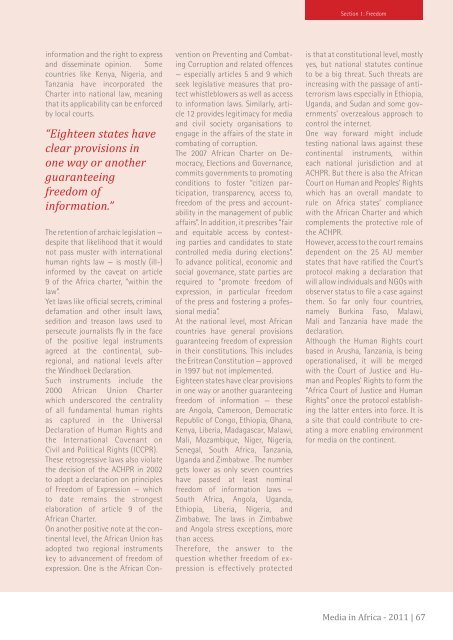Twenty years after the Windhoek Declaration on press freedom
Twenty years after the Windhoek Declaration on press freedom
Twenty years after the Windhoek Declaration on press freedom
Create successful ePaper yourself
Turn your PDF publications into a flip-book with our unique Google optimized e-Paper software.
informati<strong>on</strong> and <str<strong>on</strong>g>the</str<strong>on</strong>g> right to ex<strong>press</strong><br />
and disseminate opini<strong>on</strong>. Some<br />
countries like Kenya, Nigeria, and<br />
Tanzania have incorporated <str<strong>on</strong>g>the</str<strong>on</strong>g><br />
Charter into nati<strong>on</strong>al law, meaning<br />
that its applicability can be enforced<br />
by local courts.<br />
“Eighteen states have<br />
clear provisi<strong>on</strong>s in<br />
<strong>on</strong>e way or ano<str<strong>on</strong>g>the</str<strong>on</strong>g>r<br />
guaranteeing<br />
<strong>freedom</strong> of<br />
informati<strong>on</strong>.”<br />
The retenti<strong>on</strong> of archaic legislati<strong>on</strong> —<br />
despite that likelihood that it would<br />
not pass muster with internati<strong>on</strong>al<br />
human rights law — is mostly (ill-)<br />
informed by <str<strong>on</strong>g>the</str<strong>on</strong>g> caveat <strong>on</strong> article<br />
9 of <str<strong>on</strong>g>the</str<strong>on</strong>g> Africa charter, “within <str<strong>on</strong>g>the</str<strong>on</strong>g><br />
law”.<br />
Yet laws like official secrets, criminal<br />
defamati<strong>on</strong> and o<str<strong>on</strong>g>the</str<strong>on</strong>g>r insult laws,<br />
sediti<strong>on</strong> and treas<strong>on</strong> laws used to<br />
persecute journalists fly in <str<strong>on</strong>g>the</str<strong>on</strong>g> face<br />
of <str<strong>on</strong>g>the</str<strong>on</strong>g> positive legal instruments<br />
agreed at <str<strong>on</strong>g>the</str<strong>on</strong>g> c<strong>on</strong>tinental, subregi<strong>on</strong>al,<br />
and nati<strong>on</strong>al levels <str<strong>on</strong>g>after</str<strong>on</strong>g><br />
<str<strong>on</strong>g>the</str<strong>on</strong>g> <str<strong>on</strong>g>Windhoek</str<strong>on</strong>g> <str<strong>on</strong>g>Declarati<strong>on</strong></str<strong>on</strong>g>.<br />
Such instruments include <str<strong>on</strong>g>the</str<strong>on</strong>g><br />
2000 African Uni<strong>on</strong> Charter<br />
which underscored <str<strong>on</strong>g>the</str<strong>on</strong>g> centrality<br />
of all fundamental human rights<br />
as captured in <str<strong>on</strong>g>the</str<strong>on</strong>g> Universal<br />
<str<strong>on</strong>g>Declarati<strong>on</strong></str<strong>on</strong>g> of Human Rights and<br />
<str<strong>on</strong>g>the</str<strong>on</strong>g> Internati<strong>on</strong>al Covenant <strong>on</strong><br />
Civil and Political Rights (ICCPR).<br />
These retrogressive laws also violate<br />
<str<strong>on</strong>g>the</str<strong>on</strong>g> decisi<strong>on</strong> of <str<strong>on</strong>g>the</str<strong>on</strong>g> ACHPR in 2002<br />
to adopt a declarati<strong>on</strong> <strong>on</strong> principles<br />
of Freedom of Ex<strong>press</strong>i<strong>on</strong> — which<br />
to date remains <str<strong>on</strong>g>the</str<strong>on</strong>g> str<strong>on</strong>gest<br />
elaborati<strong>on</strong> of article 9 of <str<strong>on</strong>g>the</str<strong>on</strong>g><br />
African Charter.<br />
On ano<str<strong>on</strong>g>the</str<strong>on</strong>g>r positive note at <str<strong>on</strong>g>the</str<strong>on</strong>g> c<strong>on</strong>tinental<br />
level, <str<strong>on</strong>g>the</str<strong>on</strong>g> African Uni<strong>on</strong> has<br />
adopted two regi<strong>on</strong>al instruments<br />
key to advancement of <strong>freedom</strong> of<br />
ex<strong>press</strong>i<strong>on</strong>. One is <str<strong>on</strong>g>the</str<strong>on</strong>g> African C<strong>on</strong>-<br />
venti<strong>on</strong> <strong>on</strong> Preventing and Combating<br />
Corrupti<strong>on</strong> and related offences<br />
— especially articles 5 and 9 which<br />
seek legislative measures that protect<br />
whistleblowers as well as access<br />
to informati<strong>on</strong> laws. Similarly, article<br />
12 provides legitimacy for media<br />
and civil society organisati<strong>on</strong>s to<br />
engage in <str<strong>on</strong>g>the</str<strong>on</strong>g> affairs of <str<strong>on</strong>g>the</str<strong>on</strong>g> state in<br />
combating of corrupti<strong>on</strong>.<br />
The 2007 African Charter <strong>on</strong> Democracy,<br />
Electi<strong>on</strong>s and Governance,<br />
commits governments to promoting<br />
c<strong>on</strong>diti<strong>on</strong>s to foster “citizen participati<strong>on</strong>,<br />
transparency, access to,<br />
<strong>freedom</strong> of <str<strong>on</strong>g>the</str<strong>on</strong>g> <strong>press</strong> and accountability<br />
in <str<strong>on</strong>g>the</str<strong>on</strong>g> management of public<br />
affairs”. In additi<strong>on</strong>, it prescribes “fair<br />
and equitable access by c<strong>on</strong>testing<br />
parties and candidates to state<br />
c<strong>on</strong>trolled media during electi<strong>on</strong>s”.<br />
To advance political, ec<strong>on</strong>omic and<br />
social governance, state parties are<br />
required to “promote <strong>freedom</strong> of<br />
ex<strong>press</strong>i<strong>on</strong>, in particular <strong>freedom</strong><br />
of <str<strong>on</strong>g>the</str<strong>on</strong>g> <strong>press</strong> and fostering a professi<strong>on</strong>al<br />
media”.<br />
At <str<strong>on</strong>g>the</str<strong>on</strong>g> nati<strong>on</strong>al level, most African<br />
countries have general provisi<strong>on</strong>s<br />
guaranteeing <strong>freedom</strong> of ex<strong>press</strong>i<strong>on</strong><br />
in <str<strong>on</strong>g>the</str<strong>on</strong>g>ir c<strong>on</strong>stituti<strong>on</strong>s. This includes<br />
<str<strong>on</strong>g>the</str<strong>on</strong>g> Eritrean C<strong>on</strong>stituti<strong>on</strong> — approved<br />
in 1997 but not implemented.<br />
Eighteen states have clear provisi<strong>on</strong>s<br />
in <strong>on</strong>e way or ano<str<strong>on</strong>g>the</str<strong>on</strong>g>r guaranteeing<br />
<strong>freedom</strong> of informati<strong>on</strong> — <str<strong>on</strong>g>the</str<strong>on</strong>g>se<br />
are Angola, Camero<strong>on</strong>, Democratic<br />
Republic of C<strong>on</strong>go, Ethiopia, Ghana,<br />
Kenya, Liberia, Madagascar, Malawi,<br />
Mali, Mozambique, Niger, Nigeria,<br />
Senegal, South Africa, Tanzania,<br />
Uganda and Zimbabwe . The number<br />
gets lower as <strong>on</strong>ly seven countries<br />
have passed at least nominal<br />
<strong>freedom</strong> of informati<strong>on</strong> laws —<br />
South Africa, Angola, Uganda,<br />
Ethiopia, Liberia, Nigeria, and<br />
Zimbabwe. The laws in Zimbabwe<br />
and Angola stress excepti<strong>on</strong>s, more<br />
than access.<br />
Therefore, <str<strong>on</strong>g>the</str<strong>on</strong>g> answer to <str<strong>on</strong>g>the</str<strong>on</strong>g><br />
questi<strong>on</strong> whe<str<strong>on</strong>g>the</str<strong>on</strong>g>r <strong>freedom</strong> of ex<strong>press</strong>i<strong>on</strong><br />
is effectively protected<br />
Secti<strong>on</strong> 1: Freedom<br />
is that at c<strong>on</strong>stituti<strong>on</strong>al level, mostly<br />
yes, but nati<strong>on</strong>al statutes c<strong>on</strong>tinue<br />
to be a big threat. Such threats are<br />
increasing with <str<strong>on</strong>g>the</str<strong>on</strong>g> passage of antiterrorism<br />
laws especially in Ethiopia,<br />
Uganda, and Sudan and some governments’<br />
overzealous approach to<br />
c<strong>on</strong>trol <str<strong>on</strong>g>the</str<strong>on</strong>g> internet.<br />
One way forward might include<br />
testing nati<strong>on</strong>al laws against <str<strong>on</strong>g>the</str<strong>on</strong>g>se<br />
c<strong>on</strong>tinental instruments, within<br />
each nati<strong>on</strong>al jurisdicti<strong>on</strong> and at<br />
ACHPR. But <str<strong>on</strong>g>the</str<strong>on</strong>g>re is also <str<strong>on</strong>g>the</str<strong>on</strong>g> African<br />
Court <strong>on</strong> Human and Peoples’ Rights<br />
which has an overall mandate to<br />
rule <strong>on</strong> Africa states’ compliance<br />
with <str<strong>on</strong>g>the</str<strong>on</strong>g> African Charter and which<br />
complements <str<strong>on</strong>g>the</str<strong>on</strong>g> protective role of<br />
<str<strong>on</strong>g>the</str<strong>on</strong>g> ACHPR.<br />
However, access to <str<strong>on</strong>g>the</str<strong>on</strong>g> court remains<br />
dependent <strong>on</strong> <str<strong>on</strong>g>the</str<strong>on</strong>g> 25 AU member<br />
states that have ratified <str<strong>on</strong>g>the</str<strong>on</strong>g> Court’s<br />
protocol making a declarati<strong>on</strong> that<br />
will allow individuals and NGOs with<br />
observer status to file a case against<br />
<str<strong>on</strong>g>the</str<strong>on</strong>g>m. So far <strong>on</strong>ly four countries,<br />
namely Burkina Faso, Malawi,<br />
Mali and Tanzania have made <str<strong>on</strong>g>the</str<strong>on</strong>g><br />
declarati<strong>on</strong>.<br />
Although <str<strong>on</strong>g>the</str<strong>on</strong>g> Human Rights court<br />
based in Arusha, Tanzania, is being<br />
operati<strong>on</strong>alised, it will be merged<br />
with <str<strong>on</strong>g>the</str<strong>on</strong>g> Court of Justice and Human<br />
and Peoples’ Rights to form <str<strong>on</strong>g>the</str<strong>on</strong>g><br />
“Africa Court of Justice and Human<br />
Rights” <strong>on</strong>ce <str<strong>on</strong>g>the</str<strong>on</strong>g> protocol establishing<br />
<str<strong>on</strong>g>the</str<strong>on</strong>g> latter enters into force. It is<br />
a site that could c<strong>on</strong>tribute to creating<br />
a more enabling envir<strong>on</strong>ment<br />
for media <strong>on</strong> <str<strong>on</strong>g>the</str<strong>on</strong>g> c<strong>on</strong>tinent.<br />
Media in Africa - 2011 | 67












